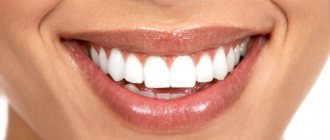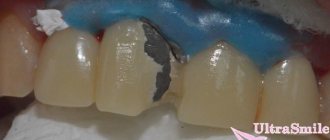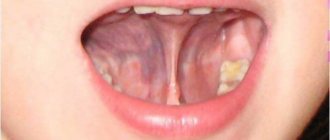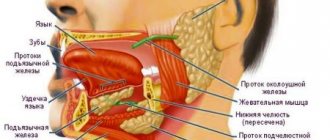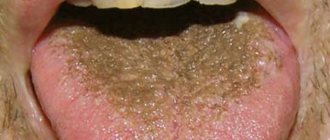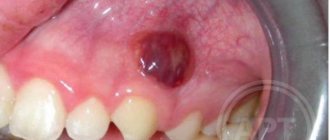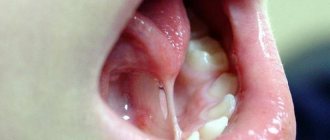The palate is a natural partition separating the mouth from the nasopharynx. It provides an important anatomical function - it is involved in chewing food, pronouncing sounds, and is also responsible for articulation. Therefore, the appearance of any uncomfortable and painful sensations brings serious problems for a person that interfere with leading a normal lifestyle.
Soreness in the palate of the mouth can indicate a wide range of problems: from the presence of external irritants that cause mechanical damage to the mucous membrane, to infectious diseases and functional disorders.
If a person has pain in the roof of his mouth, there can be many reasons. Therefore, the best way to find and eliminate them is not self-diagnosis, but contacting specialized specialists.
Functions of the sky and structural features
The palate is a vault that separates the oral cavity from the nasopharynx. The structure of the palate consists of two sections - hard and soft. This organ performs an important function - it prevents food from entering the nasopharynx from the oral cavity.
In addition, receptors on the surface of the palate are associated with the larynx and take part in articulation and influence the timbre of the voice and the pitch of sounds. Thus, the inflammatory process of the upper palate disrupts all the functions of this important organ, and therefore requires mandatory treatment.
Drug and surgical treatment
Correct diagnosis means effective treatment!
Treatment depends on the underlying cause of the pathology and is aimed at eliminating it:
- Usually, for dental problems that are accompanied by swelling of the palate, antiseptic drugs are prescribed to rinse the mouth or lubricate the damaged areas. These include rinsing solutions Furacilin, Chlorhexidine, Romazulan, Chlorophyllipt, Miramistin or Rotokan, as well as Lidochlor, Kalgel, Cholisal and Kamistad gels.
- For viral infections, the following medications are used: Acyclovir, Tebrofen ointment, Oxolinic ointment.
- If the cause is a fungus, then the following antifungal agents are most often used: Pimafucin, Nystatin ointment, Clotrimazole, Nizoral, Fluconazole, Mikozan, Candide.
- In case of swelling of the palate due to a bacterial infection, antibiotics are used. The decision about which drug to use in each individual case is made by the doctor. Macrolide, penicillin or cephalosporin antibiotics may be prescribed. Such agents are selected depending on the causative agent of the pathology.
- For severe pain in the palate due to swelling, aerosols and sprays are used to irrigate the oral cavity: Benzocaine, Diflucan, Tantum Verde, Proposol, Lidocaine Asept, Hexoral, Chlorophyllipt, Bioparox.
- In some cases, it is recommended to lubricate the mucous membrane with Iodinol or Lugol.
- In case of swelling as a result of allergies, the patient should take antihistamines.
If a malignant tumor of the palate is diagnosed, then surgery, radiation or chemotherapy is indicated. For benign formations, the following treatment methods are used:
- Laser treatment.
- Cryodestruction.
- Sclerotherapy.
- Treatment with radio waves.
- Electrocoagulation.
To accelerate tissue regeneration of the palate, experts usually prescribe mineral and vitamin complexes, as well as immunomodulators. It is important to remember that the required treatment method is determined by a specialist depending on the diagnosis, the degree of its progress and the individual characteristics of the patient’s body.
Traditional methods and advice
Rinsing the mouth will help relieve swelling of the palate faster
Healing herbs that have an anti-inflammatory effect have a good effect on the oral mucosa. Such plants include:
- St. John's wort
- Sage
- Kalina
- Chamomile
- Raspberries
- centaury
- Oak bark
Decoctions for mouth rinsing are made from these herbs. The oral cavity can be rinsed with sea buckthorn or rosehip oil and propolis tincture. For this purpose, decoctions based on onion or garlic are used.
Experts advise you to adhere to the following recommendations regarding the prevention of this pathological condition:
- Follow hygienic rules for oral care.
- Brush your teeth regularly and rinse your mouth with a special product.
- Eat right and rationally.
- Take the necessary mineral and vitamin complexes.
- Strengthen immunity.
- Do not eat very cold or too hot food.
- To refuse from bad habits.
- Avoid stressful situations and psycho-emotional stress.
- Get regular medical checkups.
- Treat dental diseases in a timely manner and visit the dentist periodically.
If you follow these recommendations, you can prevent several times the likelihood of developing diseases that are accompanied by swelling of the palate.
When should and when should you not breastfeed if you have a cold?
Why does inflammation occur?
The muscular structure of the palate is covered on top with a mucous membrane, which is subject to the development of an inflammatory process. Inflammation often occurs under the influence of such factors:
- burn of the mucous membrane as a result of consuming excessively hot food and drinks;
- damage to the palate due to dental diseases - periodontitis, stomatitis, caries, pulpitis;
- disruption of the oral environment due to the action of metals - when wearing braces or installing crowns;
- smoking;
- allergic reactions to medications;
- neurological diseases affecting the joints of the upper or lower jaw;
- osteomyelitis - an infectious lesion of the bone tissue of the jaw;
- malignant neoplasms;
- infectious diseases of the upper respiratory tract - sore throat, tonsillitis, pharyngitis, rhinitis.
The development of the inflammatory process of the palate may be facilitated by some of these causes in their entirety or separately from each other.
Reasons for the development of the inflammatory process
Inflammation of the palate near the tooth can occur:
- due to mechanical damage when eating crackers, seeds, nuts and other solid foods,
- thermal burn,
- some diseases - candidiasis, stomatitis,
- frequent smoking,
- pathologies of the jaw joints,
- inaccurate tooth extraction, violation of the rules for installing a microprosthesis.
Inflammation can develop under the influence of one or more factors. The problem cannot be ignored, as this can lead to blood poisoning, problems with breathing and swallowing.
Signs and symptoms of inflammation of the palate
Depending on the causes of inflammation in the oral cavity, a person may experience the following unpleasant symptoms:
- A feeling of acute pain that makes it difficult to eat. Soon the pain increases, sometimes even swallowing becomes impossible.
- If the inflammation is caused by the action of a fungus, a white coating and erosion forms on the surface of the palate. The process is accompanied by an unpleasant putrid odor from the mouth.
- When the cause of inflammation is an infectious lesion - sore throat or tonsillitis, the palate becomes red and swollen.
- In case of acute inflammation, an increase in body temperature and fever is possible.
- If the cause is dental disease, the patient will be bothered by toothache.
- With cancer, the patient complains of aching pain in the palate.
Anatomy of the palate
The palate, located above, has two cavities - the oral and nasal. It includes two components - the hard and soft palate. The appearance of the upper palate resembles a dome.
There is a hard part of bone in front. The components are plate-shaped processes of the bone tissue of the upper jaw. From below, the palate is enveloped in mucous tissue, which in turn passes into the soft tissue of the palate, the so-called velum palatine. The location is very close to the tonsils, above the root of the tongue.
The soft palate is formed from muscles connected by connective tissue and mucous membrane. The cavity located behind the nose is divided into 2 entrances: into the laryngeal region and into the pharynx. The second entrance provides access to the trachea and esophagus.
Important ! With inflammation, pain affects both parts of the palate.
Discomfort is observed when speaking, swallowing food, and even at rest. For a person, these sensations are quite unpleasant. Where to go in such a situation? The first step is to consult a dentist. At the initial stage, he will determine the cause of the pain and refer you to the right specialist, or, if the case relates to his medical practice, prescribe the necessary treatment.
Video - More about the palate
How is inflammation of the palate treated?
How to treat inflammation on the roof of the mouth, a specialist will tell you after determining the diagnosis. The following therapy methods can be used:
- If the cause of inflammation is minor damage to the mucous membrane, rinsing with decoctions of medicinal herbs is usually sufficient. Decoctions and infusions based on calendula, sage and chamomile have an antiseptic and healing effect. The herbal decoction for rinsing should be used warm.
- When the palate is affected by a fungus, patients are prescribed topical agents. The most effective are the solution and gel “Chlorhexidine”, “Rotokan” or “Stomatofit”.
- In case of severe pain symptoms, regardless of the cause of inflammation, drugs of combined action are prescribed. “Cholisal-gel” and “Kalgel” have proven themselves well.
- If a purulent inflammatory process is detected in the oral cavity, the patient is prescribed antibiotics. The minimum course of treatment is usually 7 days, but there are also stronger drugs that only need to be taken for 3 days. Along with local agents, antibacterial drugs for internal use - Sumamed, Flemoxin Solutab - can be prescribed.
- The inflammatory process of the palate is easily treatable. The earlier therapy is carried out, the less likely it is to develop complications.
When should you see a doctor?
If the symptoms of the disease do not go away for a long time, constantly growing and getting worse, you need to urgently consult a doctor. A consultation with a periodontist is the key to good health of the soft tissues of the mouth. Its main task is to maintain reliable fixation of the chewing organs in the gum tissues and jaws. First, a thorough diagnosis is carried out, because the clinical picture of many diseases is similar. Self-prescription of medications is unacceptable. The sooner you start therapy, the easier and faster it will go.
The initial examination allows the doctor to determine the complexity of the anomaly and assess the condition of the mucosa. For a full diagnosis, an x-ray is prescribed to find out about the extent of the lesion. Inflammatory processes are detected by a blood test. A bacteriological study is carried out to find out the type of microorganisms that led to the disease.
In case of malocclusion, it is necessary to correct the situation with the help of braces. When extensive damage is caused by chemicals, therapy is carried out in a hospital. In most cases, complex treatment of the underlying disease is used. Antibiotics may be prescribed if the pathology is caused by an infection. According to indications, the patient may be referred to specialists.
Prevention measures
Preventive measures come down to following simple rules:
- brush your teeth at least twice a day; - use mouth rinses every time after meals; - Avoid eating excessively hot food; — enrich the diet with vitamins and microelements to increase local immunity.
Elimination of stressful situations, a balanced diet, regular visits to the dentist and examination of the body - all these actions are reliable prevention of the development of inflammatory processes in the oral cavity.
How to treat inflammation of the palate depends on the causes of the development of the inflammatory process and its symptoms. To determine an accurate diagnosis, you should visit the dentist's office.
This article is for informational purposes only, please consult your doctor for details!
How to prevent diseases of the palate?
There are many reasons for pain in the palate. It is within human power to prevent burns, infections, and injuries.
It is important to follow these rules:
- the temperature of the food should not be very high or low;
- Before eating vegetables and fruits, it is important to wash them thoroughly;
- visiting the dentist should be systematic - teeth treated on time will not cause problems with the palate;
- reduce the consumption of solid foods to avoid trauma to the mucous membranes;
- Oral hygiene should be done every morning and evening;
- taking multivitamins helps strengthen the immune system, which increases the resistance of mucous membranes to infections;
- parents should talk with children about the rules of oral hygiene, explain why certain objects should not be allowed to get into the mouth;
- It is necessary to exclude contact of dirty hands with the mouth, stop biting your nails, and make it a rule to wash your hands after every trip to the toilet.
Important ! Pain in the mouth is an alarming signal that requires immediate medical attention!
In order to prevent infection, it is important to change your toothbrush after treatment of dental diseases (stomatitis) or after dental prosthetics.
Stomatitis provokes increased salivation, so during the period of illness you should increase the amount of water consumption.
A dental disease that causes a red rash in the mouth
Stomatitis is a disease that can cause the formation of red dots on the upper palate. This is an inflammatory process that occurs in the oral mucosa. It can be of fungal, viral or bacterial origin - it all depends on what specific pathogen has penetrated the mucous membrane.
Viral stomatitis
Caused by the herpes virus, small rashes appear not only on the palate, but also on the inside of the cheeks and lips, and tongue. The first two days of illness, the rash remains red and large, and then it transforms into blisters that are filled with serous fluid - clear or cloudy.
Viral stomatitis in each case is accompanied by elevated body temperature, weakness, lack of appetite and pain, a burning sensation in the mouth. This form of the disease is mainly diagnosed in adults and newborns.
Bacterial form of pathology
Most often, the oral mucosa is affected by staphylococcus and streptococcus. It is the latter that is considered the most dangerous, because it provokes various kinds of complications, including general blood poisoning. Bacterial stomatitis in almost every case ends with the development of tonsillitis, tracheitis or pharyngitis.
Red dots appear on the white palate, they never merge, but cause some discomfort to the patient: they itch, there is a burning sensation, the sensitivity of the mucous membrane to hot and cold, sour and salty increases. After a few days, the rash becomes barely noticeable, but the patient’s body temperature rises, and one of the above diseases rapidly develops.
Fungal stomatitis
Most often, the fungus affects the mucous membranes of those people who have weakened immune systems. In an adult, this can happen due to prolonged use of certain medications or a long course of the disease. Children often suffer from fungal stomatitis. “Thrush” develops due to constant licking of toys, pieces of furniture and imperfect immunity due to age.
There are not only red rashes in the mouth, but also a white coating. It is characteristic of this disease and helps to make an accurate diagnosis and prescribe effective treatment. Additional symptoms include pain and burning in the mouth, restlessness in a child, and a feeling of fatigue in an adult.
